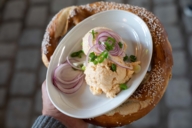
There is nowhere better to enjoy the sunshine than in a beer garden – provided that you are familiar with the local customs. Ten survival tips.
In Munich, we call it “Helles”. Bottom-fermented lager is particularly mild and sparkling. Most beer gardens stock beer from one of Munich’s six big breweries: Augustiner, Hofbräu, Hacker-Pschorr, Löwenbräu, Paulaner and Spaten.
In Munich beer gardens, the beer is traditionally served in a one-litre mug, or Maß (stein). Since one full stein alone weighs over two kilos, novices will hardly be able to carry more than three mugs. Hardly anyone could lift a round for a full beer garden table.
In the 19th century, Munich brewers began serving beer directly at their breweries. In order to ensure that this did not give rise to rivalry with the innkeepers, King Maximilian I of Bavaria issued a decree in 1812 permitting the serving of drinks in beer gardens, but not the sale of food. Even today, anyone visiting a beer garden can bring their own food.
“Gemütlichkeit”, or cosiness, is at least as much a part of Munich’s beer gardens as the beer itself – or, as it says in the Beer Gardens Ordinance: “Beer gardens fulfil important social and communicative functions”. Therefore, you should move up if there is room, introduce yourself using your first name, toast one another and feel at home.
Some exceptions to the rule concerning sociability: you cannot simply take a seat at one of the many Stammtische (tables reserved for regulars); these seats are a hard-earned privilege. Only those who are expressly invited to do so may join a Stammtisch.
The traditional Steckerlfisch (fish grilled on a stick) is eaten with the fingers or a small wooden skewer. Nobody needs cutlery to eat it – this is also the case with the Obatzden (Bavarian cheese spread), which can and should be eaten directly with the pretzel.
Only toasting your neighbour before your first mouthful? You might get away with doing that in Prussia, but not in convivial Bavaria. The rule of thumb is: we toast ten times per stein. After that, however, you can decide whether to put down your mug for a while or drink from it immediately.
The last mouthful in the glass is called the “Noagerl” in Bavarian – and as far as the Bavarians are concerned, the glass is just where it should stay. Those who drink it anyway are called “Noagerlzuzler” – and this doesn’t just sound like an insult; it is one!
Admittedly, this really only applies to the Biergarten in the Hirschgarten, but it is also another wonderful Munich tradition: in order to save the staff some work, washbasins are provided for patrons to rinse out their glasses before getting a refill.
No matter how mild and atmospheric the night may be, a bell sounds every night at 10:30 p.m. sharp, signalling closing time. When the lights go on and off again half an hour later at the very most, it really does mean that’s it for today. After all, it’s best to finish on a high note.